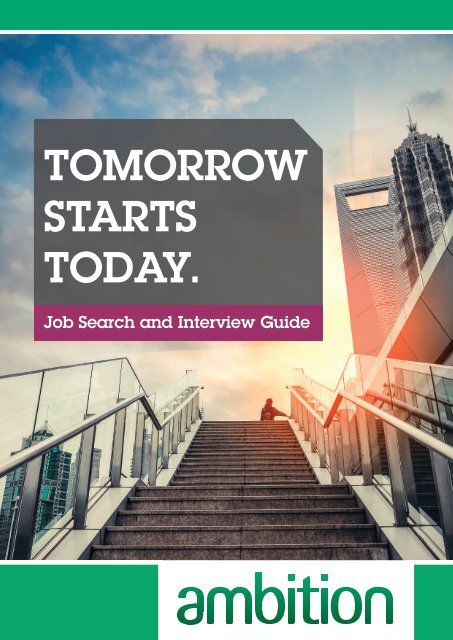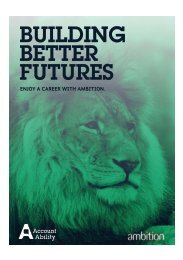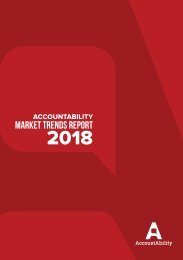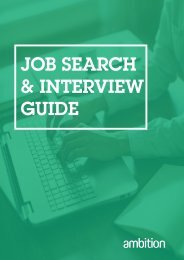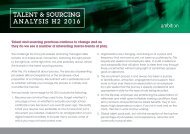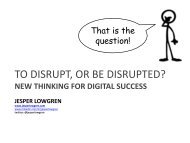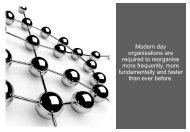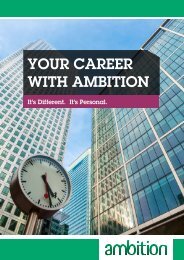Candidate_job_search_and_interview_guideAU2015
You also want an ePaper? Increase the reach of your titles
YUMPU automatically turns print PDFs into web optimized ePapers that Google loves.
TOMORROW<br />
STARTS<br />
TODAY.<br />
Job Search <strong>and</strong> Interview Guide
2 Ambition<br />
“<br />
Every journey starts<br />
with a single step.<br />
”
3 Ambition<br />
Contents<br />
Introduction 4<br />
Working with recruitment agencies 5<br />
Your <strong>job</strong> <strong>search</strong> 6<br />
Effective resume writing 8<br />
Interviews 12<br />
• Top 10 <strong>interview</strong> questions 13<br />
• Competency based <strong>interview</strong>s 17<br />
• Alternative questions 21<br />
• Psychometric questions 22<br />
• Interview preparation 24<br />
• Ten reasons for rejection 28<br />
Resigning with confidence 30<br />
Contacts 34
4 Ambition<br />
Introduction to Ambition<br />
Ambition is a leading global boutique recruitment business operating<br />
in a select number of specialist areas across Australia, the UK,<br />
Singapore, Hong Kong, Japan <strong>and</strong> Malaysia.<br />
Our Australian business has offices in Sydney, Parramatta, Melbourne<br />
<strong>and</strong> Brisbane. One of our central strategies is specialisation <strong>and</strong> our<br />
core practice areas are as follows:<br />
Commerce & Industry<br />
Banking & Financial Services<br />
Technology<br />
We believe our size is a significant differentiator in the recruitment<br />
industry. We are big enough to undertake large scale projects for our<br />
clients yet retain the soul <strong>and</strong> personality of a smaller company.<br />
We are best known for our specialisation with in-depth market<br />
knowledge <strong>and</strong> expertise <strong>and</strong> our well-established networks.<br />
We are committed to building better futures for our community of<br />
clients, c<strong>and</strong>idates <strong>and</strong> employees.<br />
Ambition should be a key part of your <strong>job</strong> <strong>search</strong> strategy. With<br />
our knowledge of the market <strong>and</strong> excellent client relationships with<br />
organisations across various industries <strong>and</strong> functions, our team of<br />
specialist recruitment consultants can open doors for you.
5 Ambition<br />
Working with recruitment agencies<br />
Choose your recruiter carefully<br />
Employment agencies <strong>and</strong> recruiters come in all shapes <strong>and</strong> sizes <strong>and</strong><br />
can vary greatly in quality. Choose to work with a company that you, or<br />
colleagues, or friends have had a good experience with.<br />
Beware of the practice of some less ethical companies in sending out<br />
your resume to companies without your knowledge. Always insist<br />
that recruiters have your permission to send out your resume to a<br />
prospective employer, whether it be a specific or speculative approach.<br />
At Ambition, we specialise in a few functional disciplines <strong>and</strong> work<br />
ethically <strong>and</strong> professionally so that we can provide you, the <strong>job</strong> seeker,<br />
with informed <strong>and</strong> objective <strong>job</strong> <strong>search</strong> <strong>and</strong> career management<br />
advice.<br />
Help us to help you<br />
Recruiters are in the business to help c<strong>and</strong>idates with their <strong>job</strong> <strong>search</strong><br />
<strong>and</strong> the ‘easier’ you are to help, the more likely they are to spend time<br />
assisting you with your <strong>job</strong> <strong>search</strong>. Help them, <strong>and</strong> yourself, by having<br />
a good underst<strong>and</strong>ing of your own strengths <strong>and</strong> weaknesses, your<br />
career goals <strong>and</strong> <strong>job</strong> <strong>search</strong> preferences. This will enable your recruiter<br />
to find a company <strong>and</strong> <strong>job</strong> that would be the best fit for you <strong>and</strong> will<br />
help minimise the frustrations <strong>and</strong> mismatched expectations that<br />
come with many <strong>job</strong> <strong>search</strong>es.<br />
Stay in regular contact with the recruiter<br />
It is important that you take responsibility by having a ‘contact<br />
program’, whereby you call your recruiter at least once every three<br />
months. Your recruiter can advise on market trends, skills in dem<strong>and</strong><br />
<strong>and</strong> salary movements.
6 Ambition<br />
Ambition’s recruitment process<br />
Once you have had a face-to-face meeting or a detailed phone<br />
<strong>interview</strong> with a recruitment consultant at Ambition, your details will<br />
be logged on our database with the strictest confidentiality.<br />
At Ambition, we we work as a team to help you find opportunities that<br />
interest you. All of our consultants have access to our full database<br />
<strong>and</strong> can contact any c<strong>and</strong>idate whenever they see a <strong>job</strong> fit. This<br />
is as opposed to a recruitment consultant hoarding one particular<br />
c<strong>and</strong>idate <strong>and</strong> thus denying that c<strong>and</strong>idate other career opportunities<br />
that are available through their colleagues.<br />
Your <strong>job</strong> <strong>search</strong><br />
Here are some <strong>job</strong> <strong>search</strong> tips to get you started:<br />
Voicemail – Have a professional voicemail message set up on your<br />
phone to ensure you do not miss out on any opportunities.<br />
Professional email address – Consider creating a separate email<br />
account to utilise during your <strong>job</strong> <strong>search</strong>. This will help you keep you<br />
organised. Avoid any funny or risqué email addresses which may cause<br />
the reader to question your character.<br />
Customise your approach – Update the content on your resume<br />
<strong>and</strong> cover letter to match the requirements of the <strong>job</strong> you are applying<br />
for. Using key words will ensure you st<strong>and</strong> out <strong>and</strong> are noticed amongst<br />
the crowd.<br />
Use us – Visit the Ambition website (www.ambition.com.au) as your first<br />
port of call for a full listing of <strong>job</strong>s across Commerce & Industry, Banking &<br />
Finance <strong>and</strong> Technology. You can register your details <strong>and</strong> latest resume on<br />
our site <strong>and</strong> set up <strong>job</strong> alerts specific to your area of interest. If you see a<br />
<strong>job</strong> of interest, apply or contact your consultant.
7 Ambition<br />
Using <strong>job</strong> boards <strong>and</strong> alerts – There are a number of <strong>job</strong> <strong>search</strong><br />
engines that you can utilise to extend your <strong>search</strong>. You can also<br />
register to receive email alerts to <strong>job</strong>s that fit your <strong>search</strong> criteria.<br />
Popular <strong>job</strong> boards:<br />
www.seek.com.au<br />
www.indeed.com.au<br />
www.adzuna.com.au<br />
www.careerone.com.au<br />
Get social – Social network sites such as LinkedIn, Facebook<br />
<strong>and</strong> Twitter can be a great way to network <strong>and</strong> connect with key<br />
influencers <strong>and</strong> companies you are interested in. Consider what<br />
information you provide on your skills, background <strong>and</strong> interests.<br />
Choose the appropriate forum for those people you think you want to<br />
connect with.<br />
If you are going to utilise social media in your <strong>job</strong> <strong>search</strong> make sure<br />
your profile picture <strong>and</strong> overall presentation is professional.<br />
We regularly post hot <strong>job</strong>s, career advice <strong>and</strong> the latest market<br />
information on our social media platforms, so follow us to stay up-todate.<br />
Make the most of your contacts – Stay in touch with your<br />
professional contacts so you are up to date <strong>and</strong> aware of possible<br />
business changes <strong>and</strong> <strong>job</strong> opportunities.
8 Ambition<br />
Effective resume writing<br />
Your resume, along with the cover letter, serves as an important<br />
marketing tool in creating a positive first impression on prospective<br />
employers. It will determine whether or not you will secure an<br />
<strong>interview</strong>, as employers use it as an initial basis to evaluate your<br />
potential c<strong>and</strong>idacy.<br />
Prepare a great resume<br />
A well written, visually appealing, impressive resume is the one most<br />
likely to get an <strong>interview</strong> because it is a reflection of how you present<br />
yourself. The best way to achieve this is with a concise resume that<br />
highlights your skills <strong>and</strong> your accomplishments.<br />
It should also emphasise your most favourable attributes that can add<br />
value to the <strong>job</strong> <strong>and</strong> the organisation. Remember, your resume is your<br />
personal sales tool.<br />
Layout<br />
Your name <strong>and</strong> contact details.<br />
Career summary/objective (optional) – this should be a few lines<br />
of around 15 – 20 words describing who you are, what you have<br />
achieved in your career to date <strong>and</strong> the type of role you are seeking.<br />
Ensure that what you write is interesting <strong>and</strong> insightful or leave it out<br />
altogether.<br />
Education & qualifications – this should not take up more than 1/4 of<br />
the page. Include the qualification attained, the conferring institution<br />
<strong>and</strong> year of graduation, with the most recent listed first.<br />
Dates of employment – (From/To in months <strong>and</strong> years) with<br />
employer <strong>and</strong> <strong>job</strong> title.<br />
I.T. skills – include any computer skills <strong>and</strong> packages that are relevant<br />
to the role you are applying for, together with level of proficiency.
9 Ambition Job Search & Interview Guide 9<br />
Language skills – include languages, <strong>and</strong> state the degree of<br />
proficiency in reading, writing <strong>and</strong> speaking.<br />
Employer – include a brief description of their business.<br />
Responsibilities – you should briefly outline the scope of your<br />
current/previous <strong>job</strong>’s responsibilities, this will give the reader an<br />
indication of the level at which you work. Use bullet points to make<br />
them easier to read.<br />
Achievements – this is the single most important part of your<br />
resume <strong>and</strong> the section that will set you apart from other c<strong>and</strong>idates.<br />
For each role there should be 2-4 achievements that you can list.<br />
Examples could include: “increased team productivity by 20%,<br />
increased sales by 17% year on year.” Use bullet points.<br />
There should be no gaps in your resume. If there are, you should fill<br />
this with whatever you were doing e.g. looking for a <strong>job</strong> or travelling.<br />
Include this in the body of the resume – not at the beginning or end –<br />
so that it’s easy to see where you’ve been on a continuous basis.<br />
Spelling <strong>and</strong> grammar<br />
Poor spelling or grammar can ruin an otherwise compelling resume.<br />
Pay attention <strong>and</strong> get it checked. Also, always write ‘<strong>and</strong>’ instead of<br />
‘&’, unless indicating a firm or a partnership e.g. Bird & Bird, Finance &<br />
Accounting.<br />
Update your resume regularly<br />
You should review your resume at least once a year to update it with<br />
new accomplishments or career changes (promotions, expansion of<br />
responsibilities, achievements <strong>and</strong> awards), even if you are not actively<br />
seeking a new position. The next few pages provide an example of a<br />
well written <strong>and</strong> structured resume to assist you.
10 Ambition<br />
Please note that there is no “one size fits all” format when it comes to<br />
resumes, but the example below should help you get on your way.<br />
Samantha Jones<br />
5 Chester Road,<br />
Vaucluse,NSW 2030<br />
0437 529 673<br />
samantha.jones@maxmail.com<br />
• We recommend using Arial font size 10.<br />
• Use black font - no colours!<br />
• Don’t forget current & correct contact details.<br />
• Also, have a professional voicemail message &<br />
email address!<br />
CAREER OBJECTIVE<br />
To apply <strong>and</strong> continually develop my analytical <strong>and</strong> technical abilities in a challenging<br />
environment where growth, initiative, attention to detail <strong>and</strong> improvement are valued <strong>and</strong><br />
encouraged; an environment that empowers me to deliver outcomes that I am responsible<br />
for with pride.<br />
Spell check & get someone to proof read<br />
EDUCATION & QUALIFICATIONS<br />
2008-2010<br />
Institute of Chartered Accountants<br />
Chartered Accountant<br />
First Time Passes<br />
2005-2007<br />
University of Sydney<br />
Awarded: Bachelor of Science (Mathematics)<br />
2004<br />
Strathfield High School<br />
Higher School Certificate<br />
ATAR of 92<br />
• This section should only include<br />
recent qualifications that relate to the<br />
<strong>job</strong> you are applying for.<br />
• Do not include modules on your<br />
resume unless you are just beginning<br />
your career or have done very relevant<br />
modules in your degree.<br />
• Ensure you include your grades for<br />
ATAR <strong>and</strong> upwards.<br />
EMPLOYMENT HISTORY<br />
KOMAC (Major FMCG Conglomerate)<br />
Financial Analyst<br />
June 2010 – present<br />
Remember, not everyone knows your company.<br />
Include a brief line to confirm the line of business<br />
<strong>and</strong> the department you work for.<br />
• Preparing monthly management accounts at a divisional <strong>and</strong> consolidated level,<br />
including variance analysis <strong>and</strong> commentary.<br />
• Developing a new set of management reports (P&L), presented to the FD, following the<br />
acquisition of a new business.<br />
• Monthly preparation <strong>and</strong> reporting of Balanced Scorecard (set of cross-functional KPI’s)<br />
involving co-ordination of inputs from the operational areas of the business.<br />
• Preparing analysis on new product revenue, cost, EBIT result, volume assumptions <strong>and</strong><br />
competitor analysis on pricing <strong>and</strong> promotion activity.
11 Ambition<br />
Key Achievements:<br />
• Elevated to the Management Reporting Manager role for a three-month period whilst<br />
the position was vacant due to a secondment, which entailed responsibility for three<br />
employees <strong>and</strong> overall management of the budget process.<br />
• Integral part of the implementation of the new online reporting system (Cognos) for<br />
the business, which involved liaising with internal business partners <strong>and</strong> technical<br />
systems experts as well as developing, implementing <strong>and</strong> maintaining scorecard web<br />
pages for each department of the business to use interactively.<br />
• Monthly budgeting <strong>and</strong> forecasting <strong>and</strong> provision of qualitative commentary to senior<br />
management.<br />
Ensure consistency in What is an achievement?<br />
ATR (Big 4 Chartered Firm) the format of dates. It Ensure it is quantifiable<br />
Senior Auditor<br />
looks more professional if & measurable. If you<br />
September 2007 – May 2010 months <strong>and</strong> years are not reduced time or costs or<br />
abbreviated.<br />
created revenue, this is<br />
an ideal place to state it.<br />
Responsibilities:<br />
• Managed day to day audit engagements - preparing the audit file, process gaps <strong>and</strong><br />
recommendations report, maintain client relationships <strong>and</strong> review of junior audit staff<br />
work papers.<br />
• Prepared <strong>and</strong> reviewed financial statements for both listed, non-listed, general purpose<br />
<strong>and</strong> special purpose financial reporting.<br />
• Responsible for the preparation <strong>and</strong> management of audits including the identification<br />
of high, medium <strong>and</strong> low business risks <strong>and</strong> preparation of Audit Report <strong>and</strong> findings<br />
to management.<br />
• Supervised graduate accountants <strong>and</strong> consultants on audits.<br />
• Identified <strong>and</strong> tested audit clients key controls <strong>and</strong> high risk areas. Reviewed <strong>and</strong><br />
mapped business processes <strong>and</strong> identified areas for improvement, strengths <strong>and</strong><br />
weaknesses.<br />
• Produced detailed Profit <strong>and</strong> Loss <strong>and</strong> Balance Sheet reviews including analysing<br />
sales, cost <strong>and</strong> gross profit by type of products/categories, sale quantities <strong>and</strong> region.<br />
• Financial management <strong>and</strong> analysis of cost vs. budget <strong>and</strong> forecasting for<br />
engagements.<br />
I.T. SKILLS<br />
Excellent comm<strong>and</strong> of Sage, QuickBooks, Oracle, SAP, Microsoft Office.<br />
LANGUAGES<br />
Spanish (fluent)<br />
French (beginner)<br />
References provided upon request.<br />
It is not necessary to put referee<br />
contact details on your resume.
12 Ambition<br />
Interviews<br />
Individuals who perform well at <strong>interview</strong>s receive <strong>job</strong> offers, often<br />
ahead of those who may be better qualified but do not perform as<br />
well. Needless to say, a good <strong>interview</strong> technique is vital to securing a<br />
<strong>job</strong>. The good news is that your <strong>interview</strong> technique can be practiced<br />
<strong>and</strong> polished.<br />
The <strong>interview</strong> is also very important for your own assessment of the<br />
organisation, the <strong>job</strong>, the people <strong>and</strong> how the <strong>job</strong> opportunity fits<br />
into your career plan. In the same way that potential employers will be<br />
assessing you, you must also take the opportunity to assess them <strong>and</strong><br />
the role.<br />
There are always three questions the <strong>interview</strong>er wants answered after<br />
having met you:<br />
1. Can you do the <strong>job</strong>?<br />
Do you have the necessary knowledge, skills <strong>and</strong> experience to do the<br />
<strong>job</strong> to the level required?<br />
2. Do you want to do the <strong>job</strong>?<br />
Are you motivated to do the <strong>job</strong>? Does it logically fit into your career<br />
plan? Is there enough scope for you to develop in the role?<br />
3. Will you fit into the team?<br />
Is there compatibility between you <strong>and</strong> the existing people in the<br />
team? Do you share similar values <strong>and</strong> visions?<br />
Essentially, employers only have one agenda, <strong>and</strong> that is to ascertain<br />
if you are the right c<strong>and</strong>idate for the <strong>job</strong>. Similarly you should take the<br />
opportunity to better underst<strong>and</strong> the role <strong>and</strong> the organisation to<br />
decide whether it is the right role for you.
13 Ambition<br />
Top 10 <strong>interview</strong> questions...<br />
<strong>and</strong> how you should answer them<br />
As the saying goes, “If you fail to plan, you plan to fail”. Below are some<br />
valuable insights into the most commonly asked <strong>interview</strong> questions<br />
<strong>and</strong> the techniques you can use to answer them.<br />
The key things to remember when responding to <strong>interview</strong> questions<br />
are to keep your answers relevant, brief <strong>and</strong> to the point. If you are<br />
faced with a difficult question, stay calm, don’t get defensive, <strong>and</strong> take<br />
a moment to think about your response before you answer.<br />
Q. Tell me about yourself.<br />
A. What this question really means is “Tell me something that will<br />
matter to me as I consider you for this <strong>job</strong>.” Identify some of your main<br />
attributes <strong>and</strong> memorise them. Describe your qualifications, career<br />
history <strong>and</strong> range of skills, emphasising those that are relevant to the<br />
<strong>job</strong> on offer.<br />
Q. What do you like about your present <strong>job</strong>?<br />
A. This is a straightforward question. All you have to do is make sure<br />
that your “likes” correspond to the skills, experiences, etc. required in<br />
the <strong>job</strong> on offer. Be enthusiastic, describe your <strong>job</strong> as interesting <strong>and</strong><br />
diverse but don’t overdo it - after all, you are looking to leave.<br />
Q. Why do you want to leave your current employer?<br />
A. State how you are looking for a new challenge, more responsibility,<br />
experience <strong>and</strong> a change of environment. Do not be negative in your<br />
reasons for leaving. It is rarely appropriate to cite salary as your primary<br />
motivator.
14 Ambition<br />
Q. What have your achievements been to date?<br />
A. Select an achievement that is work-related <strong>and</strong> fairly recent. Identify<br />
the skills you used in the achievement <strong>and</strong> quantify the benefit it had<br />
to the company.<br />
For example, “My greatest achievement has been to design <strong>and</strong><br />
implement a new sales ledger system, bringing it in ahead of time<br />
<strong>and</strong> improving our debtors’ position significantly, saving the company<br />
£50,000 per month in interest.”<br />
Q. What is the most difficult situation you have had to face<br />
<strong>and</strong> how did you tackle it?<br />
A. The purpose of this question is to find out what your definition of<br />
difficult is <strong>and</strong> whether you can show a logical approach to problem<br />
solving. In order to show yourself in a positive light, select a difficult<br />
work situation which was not caused by you <strong>and</strong> which can quickly be<br />
explained in a few sentences. Explain how you defined the problem,<br />
what the options were, why you selected the one you did <strong>and</strong> what the<br />
outcome was. Always end on a positive note.<br />
Q. Are you happy with your career to date?<br />
A. This question is really about your self-esteem, confidence <strong>and</strong> career<br />
aspirations. The answer must be “yes” followed by a brief explanation<br />
as to what it is about your career so far that’s made you happy. If you<br />
have hit a career plateau, or feel you are moving too slowly, you must<br />
qualify your answer.
15 Ambition<br />
Q. What do you dislike about your present <strong>job</strong>?<br />
A. Be cautious with this answer. Don’t be too specific as you may draw<br />
attention to weaknesses that will leave you open to further problems.<br />
One approach is to choose a characteristic of your present company,<br />
such as its size or slow decision-making processes. Give your answer<br />
with the air of someone who takes problems <strong>and</strong> frustrations in your<br />
stride as part of the <strong>job</strong>.<br />
Q. What are your strengths?<br />
A. This is one question that you know you are going to get so there<br />
is no excuse for being unprepared. Concentrate on discussing your<br />
main strengths. List three or four proficiencies e.g. your ability to learn<br />
quickly, determination to succeed, positive attitude, your ability to<br />
relate to people <strong>and</strong> achieve a common goal. You may be asked to give<br />
examples of these so be prepared.<br />
Q. What is your greatest weakness?<br />
A. Do not say that you don’t have any - this will lead to further<br />
problems. You have two options - use a professed weakness such as a<br />
lack of experience (not ability) on your part in an area that is not vital<br />
to the <strong>job</strong>. The second option is to describe a personal or professional<br />
weakness that could also be considered a strength, <strong>and</strong> the steps you<br />
have taken to combat it.<br />
An example would be, “I know my team think I’m too dem<strong>and</strong>ing at<br />
times - I tend to drive them pretty hard, but I’m getting much better at<br />
using the carrot <strong>and</strong> not the stick.”
16 Ambition<br />
Q. Do you have any questions for me?<br />
A. This question is pretty much guaranteed to be asked, <strong>and</strong> your<br />
response must be yes! The best questions will come as a result of<br />
listening to the questions the <strong>interview</strong>er asks you.<br />
For example,<br />
“From what you’ve been asking during the <strong>interview</strong>, it sounds like you<br />
have a problem with customer retention. Can you tell me a little more<br />
about the current situation <strong>and</strong> what the first challenges would be for<br />
the new person?”<br />
Other good examples include:<br />
What improvements or changes do you hope the new c<strong>and</strong>idate will<br />
bring to this position?<br />
How would you describe your company culture?<br />
What do you like most about working here?<br />
What qualities are you looking for in the ideal c<strong>and</strong>idate?<br />
Do not ask about benefits, salary or holidays until you have a <strong>job</strong> offer.
17 Ambition<br />
Behavioural based <strong>interview</strong>s<br />
A competency is the ability required of a person to perform their <strong>job</strong><br />
effectively - an underlying characteristic that results in effective or<br />
superior performance on the <strong>job</strong>.<br />
Behavioural-based <strong>interview</strong>ing (BBI):<br />
Behavioural based <strong>interview</strong>ing is now commonplace <strong>and</strong> is based on<br />
the premise that previous performance is a reliable indicator of future<br />
performance. Questions related to your competency to perform the<br />
<strong>job</strong> to the required st<strong>and</strong>ard will be asked, <strong>and</strong> will most likely revolve<br />
around how you have recently tackled situations you are likely to face<br />
in this particular role.<br />
The most effective way of answering these questions is to use the<br />
‘CAR’ technique:<br />
CIRCUMSTANCE - briefly describe the background to the situation<br />
ACTION - describe what you did<br />
RESULT - describe the outcome of your actions.<br />
Types of competencies:<br />
Cognitive abilities (aptitude <strong>and</strong> knowledge)<br />
The mental act or process by which knowledge is acquired including<br />
perception, intuition <strong>and</strong> reasoning. Furthermore, it is the knowledge<br />
that results from such an act or process.<br />
Personality traits (attitude)<br />
A general disposition to behave or respond in a certain way.<br />
The <strong>interview</strong>er will be aiming to elicit real examples of your past<br />
performance for the competencies that they have defined as being<br />
important to the role.
18 Ambition<br />
Cognitive abilities:<br />
Critical thinking<br />
Judgement, analytical thinking, problem solving, strategic orientation,<br />
conceptual reasoning, learning potential, general knowledge, verbal<br />
<strong>and</strong> numeric critical reasoning <strong>and</strong> information processing.<br />
Sample question:<br />
Describe a time when you had to influence an individual or different<br />
stakeholders with differing perspectives.<br />
Expertise<br />
(Professional, specialist, proficiency, skillfulness, know-how).<br />
Extensive skills or knowledge in a particular field or discipline. These<br />
are questions tailored to the technical <strong>and</strong> industry expertise of the<br />
individual.<br />
Sample question:<br />
You indicate that you have responsibility for the analysis <strong>and</strong><br />
subsequent commentary for the management accounts. What is a<br />
good example of a commercial variance that your analysis generated<br />
<strong>and</strong> what actions did you undertake?<br />
Personality traits:<br />
Stress tolerance<br />
(Self-control)<br />
Performance remains stable under pressure <strong>and</strong> in the face of setbacks,<br />
disappointments, rejection, role ambiguity <strong>and</strong> time pressure.
19 Ambition<br />
Sample question:<br />
Describe a situation when you had to decide on the right course of<br />
action in circumstances where the company rules / policies were<br />
unclear or unhelpful. What options did you consider? What action did<br />
you take? What was the result?<br />
Initiative:<br />
(Proactive, self-starter, risk taker <strong>and</strong> decisive)<br />
Actively attempts to influence events to achieve goals. Self-starting<br />
rather than passively accepting. Modifies behaviour to reach a goal.<br />
Takes calculated risks to achieve a recognised benefit or advantage.<br />
Sample question:<br />
What changes have you implemented in your area of responsibility?<br />
Conscientiousness:<br />
(Motivation, drive, industriousness, tenacity, integrity <strong>and</strong><br />
thoroughness)<br />
Strong orientation to meeting commitments. Sets high st<strong>and</strong>ards<br />
or goals for own work performance. Dissatisfied with average<br />
performance. Active efforts to develop personal capacity against<br />
requirements of current <strong>and</strong> future <strong>job</strong>s.<br />
Sample question:<br />
What is your proudest achievement in the past two years? Why?<br />
Organisational ability:<br />
(Time management, meeting deadlines, planning, use of aids, task<br />
completion <strong>and</strong> goal setting)<br />
Able to plan <strong>and</strong> schedule own time <strong>and</strong> activities. Able to work<br />
effectively with others towards the achievements of a common goal<br />
without having direct authority.
20 Ambition<br />
Sample question:<br />
How often is your time disrupted with unforeseen circumstances?<br />
What do you do then? Give me a recent example.<br />
Relationship effectiveness:<br />
(Co-operation, teamwork, impact, rapport, energy, confidence <strong>and</strong><br />
independence)<br />
Seeks to co-operate with others, often across internal <strong>and</strong> external<br />
boundaries, in order to achieve objectives. Works effectively as a<br />
member of a team. Underst<strong>and</strong>s impact of own actions on customers<br />
<strong>and</strong> people in other parts of own organisation <strong>and</strong> consults with them<br />
to achieve objectives.<br />
Sample question:<br />
What is the best team of which you have been a member? What was<br />
good about it <strong>and</strong> what was your involvement with the team?
21 Ambition<br />
Alternative questions<br />
Remember, <strong>interview</strong>ers do not always stick to st<strong>and</strong>ard competency<br />
based questions - they can ask a whole range of things to better gauge<br />
your personality <strong>and</strong> underst<strong>and</strong> how you work. We have compiled a<br />
list below of ‘alternative’ questions that can be asked. These include<br />
questions so obvious that people can often forget to prepare for them<br />
<strong>and</strong> others that seem complex but actually don’t have a specific answer<br />
<strong>and</strong> are instead being used to assess your verbal reasoning skills.<br />
If you were to become the CEO what would be the first thing you’d<br />
put into place?<br />
Describe yourself in three words.<br />
How would your boss/friends describe you?<br />
What irritates you?<br />
What’s your favourite book?<br />
If you had your current manager’s <strong>job</strong>, what would you do differently?<br />
What were your weaknesses in your last three appraisals?<br />
Why should I hire you?<br />
What do you feel are the worst <strong>and</strong> best things about this <strong>job</strong>?<br />
Think of a situation where you have delivered bad news. What<br />
approach did you take?<br />
How many tennis balls are there in New South Wales?<br />
How do you weigh an elephant without using a scale?<br />
If you were in a rowing boat <strong>and</strong> it was sinking, what would you do?
22 Ambition<br />
Psychometric testing<br />
Our clients occasionally use psychometric testing as a part of their<br />
recruitment process. Many people will tell you that there is very little<br />
you can do to prepare for these tests, however we have provided some<br />
helpful tips <strong>and</strong> suggestions for you.<br />
What is psychometric testing?<br />
Psychometric testing is a selection of tests that measure a<br />
c<strong>and</strong>idate’s relevant strengths <strong>and</strong> weaknesses. Clients use this to<br />
assess employment suitability, including culture fit. The purpose of<br />
psychometric tests, in addition to the traditional <strong>interview</strong> process, is<br />
to gain an accurate bearing of the c<strong>and</strong>idate’s cognitive abilities <strong>and</strong><br />
personality/behavioural style.<br />
Why do clients use testing?<br />
It is a very expensive process to hire a new employee so clients like to<br />
gain as much information as possible about a c<strong>and</strong>idate’s suitability.<br />
Similar to the re<strong>search</strong> that you will do on a new employer <strong>and</strong> their<br />
suitability to you, the client will also gather data to make an informed<br />
choice about a potential employee.<br />
Types of psychometric test<br />
Personality tests aim to identify a personality type <strong>and</strong> there are no<br />
‘right’ or ‘wrong’ answers. They often take the form of paired items or<br />
pictures from which you are asked to choose a preference e.g. would<br />
you rather read a book or go to a party?<br />
To prepare for a personality test:<br />
Do practice tests so that you are familiar with the style <strong>and</strong> format of<br />
the questions.<br />
Answer questions honestly without trying to guess the ‘right answer’.
23 Ambition<br />
Ability or aptitude tests are designed to assess your reasoning<br />
or cognitive ability. They can include written information, numerical<br />
data or patterns. They are usually timed so speed <strong>and</strong> accuracy are<br />
important.<br />
To prepare for an aptitude test:<br />
Practice as many tests as possible.<br />
Try to find out whether there are any specific tests for your type of<br />
<strong>job</strong> or industry.<br />
If you get stuck, move on to the next question <strong>and</strong> come back later.<br />
Where can I practice psychometric tests?<br />
Here are links to websites that focus on psychometric testing:<br />
http://www.psychometricinstitute.com.au/<br />
http://www.practiceaptitudetests.com/psychometric-tests/<br />
On the day of the test:<br />
Make sure you know where you are going, how you are getting there<br />
<strong>and</strong> how long it will take.<br />
Consider postponing if you are ill or have had an unexpected event<br />
that may affect your performance.<br />
Take a watch so you can keep track of time. Watch your behaviour.<br />
That means be nice to the receptionist as you are still in an ‘<strong>interview</strong>’<br />
situation.<br />
Get feedback after your assessment – if your consultant can’t give<br />
you feedback, you are legally entitled to call the company who ran<br />
the test to obtain your results. Please be professional in your dealings<br />
with the company as you could still be in the <strong>interview</strong> process.
24 Ambition<br />
Interview preparation<br />
Preparation is key<br />
There are two key secrets to <strong>interview</strong> success – preparation <strong>and</strong><br />
performance. Take several hours prior to the <strong>interview</strong> to prepare<br />
yourself.<br />
Review yourself <strong>and</strong> your proposition. Between half <strong>and</strong> two thirds<br />
of the <strong>interview</strong> will be about you, particularly your knowledge, skills,<br />
experiences <strong>and</strong> career goals. It is therefore essential that you know<br />
everything there is to know about yourself <strong>and</strong> be able to answer any<br />
question confidently <strong>and</strong> concisely. You are likely to be probed about<br />
your past, so you need to be able to describe <strong>and</strong> portray yourself in<br />
a positive <strong>and</strong> balanced manner.<br />
Review your career to date <strong>and</strong> underst<strong>and</strong> your key skills <strong>and</strong><br />
strengths, accomplishments <strong>and</strong> shortcomings, your reasons for<br />
making a move both now <strong>and</strong> previously, as well as your short <strong>and</strong><br />
medium term career goals.<br />
Re<strong>search</strong> the <strong>job</strong>. It is important to spend time analysing the <strong>job</strong><br />
advertisement or detailed <strong>job</strong> specification for two reasons - firstly, is<br />
it a role that interests you (<strong>and</strong> if so, why) <strong>and</strong> can it help to advance<br />
your career? Secondly, how <strong>and</strong> where do your skills <strong>and</strong> experience<br />
match to the role <strong>and</strong> can you add value to the company in this<br />
position.<br />
Re<strong>search</strong> the organisation – its products or services, its culture <strong>and</strong><br />
vision. It is important to re<strong>search</strong> them for several reasons – you<br />
want to know for yourself whether it’s an organisation you want to<br />
work for, in a sector you want to work in, <strong>and</strong> you may also be asked a<br />
question or wish to ask a question about them.
25 Ambition<br />
To conduct your re<strong>search</strong>, visit the organisation’s website <strong>and</strong> access<br />
information about what they do, their products or services, markets,<br />
number of employees, sales volume, growth, competitors, their<br />
unique propositions, market reputation <strong>and</strong> financial st<strong>and</strong>ing. Use the<br />
Internet to <strong>search</strong> for recent articles that are about the organisation’s<br />
performance, philosophy, culture or people.<br />
Finishing touches<br />
There are a few finishing touches required to complete your <strong>interview</strong><br />
preparation:<br />
For the purposes of the <strong>interview</strong>, dress in a professional <strong>and</strong><br />
businesslike manner <strong>and</strong> wear what you would expect to wear to<br />
meet an important client. Clean shoes <strong>and</strong> clothes are important.<br />
Ladies, avoid bright nail varnish, loud jewellery <strong>and</strong> short skirts.<br />
Men should avoid stubble <strong>and</strong> wearing any jewellery other than a<br />
watch <strong>and</strong> wedding ring.<br />
Ensure that you know who you are meeting, where <strong>and</strong> at what time.<br />
Know the directions <strong>and</strong> the time it will take you to get there. Don’t<br />
be late.<br />
Finally turn your mobile phone off prior to the <strong>interview</strong>, because you<br />
risk alienating the <strong>interview</strong>er <strong>and</strong> disrupting the flow of conversation<br />
if it rings. However, if you do forget <strong>and</strong> the phone does ring, calmly<br />
apologise <strong>and</strong> turn it off immediately without glancing at the caller<br />
ID.
26 Ambition<br />
Interview structure<br />
Interviews are usually one on one <strong>and</strong> although the approach may<br />
differ, the structure is usually the same, i.e.<br />
There is an opening period of a few minutes where the scene is being<br />
set <strong>and</strong> first impressions are being formed;<br />
A middle period in which the conversation will encompass the<br />
organisation, the <strong>job</strong> itself <strong>and</strong> you <strong>and</strong> your potential fit. This is<br />
where you will be asked many questions <strong>and</strong> is your opportunity to<br />
sell your experience;<br />
A closing period, again lasting a few minutes, will be an opportunity<br />
for the <strong>interview</strong>er to summarise <strong>and</strong> to indicate the process from<br />
here. You will also be able to ask questions here if you have not had a<br />
prior opportunity to do so. In recent years, <strong>interview</strong>s have become<br />
more sophisticated as organisations have been striving to increase<br />
the link between <strong>interview</strong> success <strong>and</strong> workplace performance.<br />
First five minutes<br />
In the first five minutes your <strong>interview</strong>er will form an impression about<br />
you that is rarely overturned, so it’s essential that you make a positive<br />
impact in the way you dress <strong>and</strong> the way you communicate. A smile,<br />
a positive greeting, good eye contact <strong>and</strong> a firm h<strong>and</strong>shake really do<br />
matter.
27 Ambition<br />
Perform in the <strong>interview</strong><br />
In the <strong>interview</strong> you need to build rapport quickly with your<br />
<strong>interview</strong>er <strong>and</strong> you can do so by;<br />
Projecting energy, interest <strong>and</strong> sincerity.<br />
Quickly analysing the <strong>interview</strong>er’s style <strong>and</strong> adjusting your approach<br />
accordingly.<br />
Paying attention to your body language, particularly maintaining eye<br />
contact, which generates trust, confidence <strong>and</strong> credibility. Also, let<br />
your facial expressions reflect the flow <strong>and</strong> tone of the discussion,<br />
smiling where appropriate.<br />
Listening carefully to comments <strong>and</strong> questions <strong>and</strong> answering<br />
thoroughly <strong>and</strong>, where possible, concisely.<br />
Finish in style<br />
Whilst first impressions are important as both the <strong>interview</strong>er <strong>and</strong><br />
yourself form an instant judgment about each other, final impressions<br />
are also crucial. Final impressions can sway a neutral view to a positive<br />
one by a strong finish. When the <strong>interview</strong>er has signalled the end of<br />
the <strong>interview</strong> you should thank the <strong>interview</strong>er for their time, reaffirm<br />
your interest in the position <strong>and</strong> in working with them. You should use<br />
this approach even if your initial reaction to the <strong>job</strong> is negative – it’s<br />
always easier to change your mind from yes to no than from no to yes.<br />
Follow up after the <strong>interview</strong><br />
Follow up after the <strong>interview</strong> with your Ambition consultant <strong>and</strong> keep<br />
in touch.
28 Ambition<br />
Ten reasons for rejection<br />
Poor attitude: Whilst confidence is key in selling youself during an<br />
<strong>interview</strong>, overdoing it can be construed as being arrogant. Whilst<br />
employers can afford to be self-centred, c<strong>and</strong>idates cannot.<br />
Appearance: Many c<strong>and</strong>idates do not consider their appearance as<br />
much as they should. First impressions are quickly made in the first<br />
three to five minutes.<br />
Lack of re<strong>search</strong>: It’s obvious when c<strong>and</strong>idates haven’t learnt about<br />
the <strong>job</strong>, company or industry prior to <strong>interview</strong>. Use the Internet to<br />
re<strong>search</strong> the company. Talk with friends, peers <strong>and</strong> other professionals<br />
about the opportunity before each meeting.<br />
Not having questions to ask: Asking questions shows your<br />
interest in the company <strong>and</strong> the position. Prepare a list of questions<br />
in advance (see page 16 for examples).<br />
Not readily knowing the answers to <strong>interview</strong>ers’ questions:<br />
Anticipate <strong>and</strong> rehearse answers to tough questions about your<br />
background, such as a recent termination or an employment gap.<br />
Practising with your spouse, friend or your Ambition consultant<br />
before the <strong>interview</strong> will help you to frame intelligent answers.<br />
Too much humility: Being conditioned not to brag, c<strong>and</strong>idates are<br />
sometimes reluctant to describe their accomplishments. Explaining<br />
how you have reached difficult or impressive goals helps employers<br />
underst<strong>and</strong> what you can do for them.
29 Ambition<br />
Not relating skills to employers’ needs: A list of sterling<br />
accomplishments means little if you can’t relate them to the<br />
company’s requirements. Reiterate your skills <strong>and</strong> convince the<br />
employer that you can do the same for them.<br />
H<strong>and</strong>ling salary issues ineptly: <strong>C<strong>and</strong>idate</strong>s often ask about<br />
salary <strong>and</strong> benefits packages too early. If they believe an employer<br />
is interested, they may dem<strong>and</strong> inappropriate amounts <strong>and</strong> price<br />
themselves out of the <strong>job</strong>. <strong>C<strong>and</strong>idate</strong>s who ask for too little<br />
undervalue themselves or appear desperate. This is where a strong<br />
relationship with your Ambition consultant can help.<br />
Lack of career direction: Job hunters who aren’t clear about their<br />
career goals often can’t spot or commit to appropriate opportunities.<br />
Not knowing what you want wastes everyone’s time.<br />
Job shopping: Some applicants, particularly those in high-tech,<br />
sales <strong>and</strong> marketing fields, will admit they’re just ‘shopping’ for<br />
opportunities <strong>and</strong> have little intention of changing <strong>job</strong>s. This wastes<br />
time <strong>and</strong> leaves a bad impression with employers they may need to<br />
contact in the future.
30 Ambition<br />
Resigning with confidence<br />
Congratulations! You’ve done the hard work, completed the <strong>interview</strong><br />
process <strong>and</strong> come out the other end with an offer for your next dream<br />
<strong>job</strong>… what now?<br />
As excited as you are for your new opportunity, it can also be a time of<br />
trepidation of having to break the news to your current manager <strong>and</strong><br />
team – how will they respond? Will you be walked immediately, or are<br />
you facing a tough few weeks ahead to serve out your notice period?<br />
Most importantly, how will be you remembered? You can’t control<br />
how others will feel about your decision to move on, but you can<br />
significantly impact how they respond <strong>and</strong> their lasting impressions of<br />
you long after you have left the building.<br />
The resignation process<br />
There are three key stages to the resignation process:<br />
1. Preparing to resign<br />
2. H<strong>and</strong>ing in your resignation<br />
3. Working out your notice period<br />
Preparing to resign<br />
Before you have the conversation with your manager, take time to<br />
consider how you wish to deliver the message <strong>and</strong> your responses to<br />
some likely questions. These may include:<br />
When <strong>and</strong> where to have the conversation – e.g. during a one-to-one<br />
catch up versus in a team meeting? In a meeting room versus an open<br />
plan office? At the start or end of a meeting?
31 Ambition<br />
Check your required notice period – you need to be aware of the<br />
minimum requirement, consider the expected timeframes for starting<br />
in your new role, <strong>and</strong> you may consider offering to stay for additional<br />
time if it is a crucial time for your team.<br />
Why are you leaving? – If there is a negative reason behind your<br />
decision to leave will you tell your manager <strong>and</strong>, if yes, how will you<br />
broach the issue?<br />
Where are you going? – Some people are happy to tell their manager<br />
about their new employer, others choose to keep it to themselves.<br />
Ensure you are aware of any company requirements to notify them if<br />
you are moving to a competitor <strong>and</strong> use your good judgement – the<br />
world is a small <strong>and</strong> very interconnected place in this day <strong>and</strong> age!<br />
What would it take to make you stay? – Be prepared that your<br />
manager may try to keep you by offering a salary increase, time off<br />
or additional benefits, so it is best to have considered how you will<br />
respond to any such offers before your resignation conversation.<br />
Being prepared to respond to these questions <strong>and</strong> address any difficult<br />
matters with tact is a crucial first step to leaving a positive impression.<br />
Resigning is always difficult as it can feel quite personal - this is where<br />
your Ambition consultant can really help you through this process.<br />
They are there to support you <strong>and</strong> help you decide the best way to<br />
approach your current employer.
32 Ambition<br />
H<strong>and</strong>ing in your resignation<br />
It is considered best practice (<strong>and</strong> common courtesy) to resign in<br />
person whenever this is possible. If this is not possible, a phone call is<br />
your next best option; it is highly recommended not to resign by email<br />
or text as the first point of notice.<br />
During the meeting you should discuss <strong>and</strong> agree your end date<br />
based on the required company notice period <strong>and</strong> your personal<br />
situation. You will need to include the agreed end date in your<br />
resignation letter to ensure it is accurately documented <strong>and</strong> there is no<br />
opportunity for confusion closer to the time.<br />
Once you have given verbal notice you should promptly send through<br />
written notice of your resignation.<br />
Examples of a well-written resignation letter can be found on our<br />
website: www.ambition.com.au/<strong>job</strong>seekers/career-advice<br />
Working out your notice period<br />
Whatever the length of your notice period, it is highly recommended<br />
that you serve it out to the best of your ability to ensure you are<br />
remembered in a positive light after your final day.<br />
During this time you should continue to deliver high quality work <strong>and</strong><br />
meet deadlines, <strong>and</strong> be committed to completing h<strong>and</strong>over notes,<br />
meetings <strong>and</strong> the up-skilling of your replacement. By your last day<br />
make sure your work area <strong>and</strong> projects are in order. Leave things in the<br />
same condition you would like to see them if you were your boss or<br />
replacement.<br />
You may want to ask particular managers, colleagues <strong>and</strong>/or direct<br />
reports for recommendation references. Even if you have already
33 Ambition<br />
l<strong>and</strong>ed a new <strong>job</strong>, look further down the road; it doesn’t hurt to keep<br />
recommendations on file <strong>and</strong> up to date on Linked in.<br />
Final thoughts<br />
Moving on from a <strong>job</strong> or company can be a time of apprehension <strong>and</strong><br />
an emotional rollercoaster. While you may feel nervous about leaving<br />
the familiarity of your current situation, remember to focus on the<br />
positive opportunity you have been offered with your new company.<br />
Do not feel guilty for leaving; the company will survive without you.<br />
Be professional <strong>and</strong> courteous <strong>and</strong> deliver your best effort during<br />
your final weeks to ensure you are remembered for all the right<br />
reasons. Then look ahead to your new opportunity, complete with<br />
fresh challenges <strong>and</strong> all the excitement that goes with the start of<br />
any journey. Congratulations!
34 Ambition<br />
Can we assist?<br />
Our consultants are trained to be proactive rather than reactive <strong>and</strong> to<br />
listen, advise <strong>and</strong> deliver exceptional recruitment services.<br />
We would be happy to discuss any recruitment needs or support you<br />
may require.<br />
Visit our website (www.ambition.com.au) to <strong>search</strong> for specific roles<br />
that we are currently advertising for <strong>and</strong> don’t forget to register your<br />
resume to receive relevent <strong>job</strong> alerts directly in your inbox.<br />
Contact us<br />
Sydney<br />
Level 5, 55 Clarence Street<br />
Sydney NSW 2000<br />
T: +61 2 9249 5000<br />
Parramatta<br />
Level 4, 3 Horwood Place<br />
Parramatta NSW 2150<br />
T: +61 2 9633 7350<br />
Melbourne<br />
Level 36, 140 William Street<br />
Melbourne VIC 3000<br />
T +61 3 8629 1000<br />
Brisbane<br />
Level 7, 410 Queen Street<br />
Brisbane QLD 4000<br />
T: +61 7 3020 0300<br />
Follow us on social media<br />
Ambition<br />
Ambition<br />
Recruit<br />
Ambition Ambition_Aust Ambitiongroup
35 Ambition<br />
Global Ambition
BUILDING BETTER FUTURES.<br />
Australia<br />
Sydney<br />
Level 5, 55 Clarence Street<br />
Sydney NSW 2000<br />
T: +61 2 9249 5000<br />
Asia<br />
Hong Kong<br />
Level 25, 28 Hennessy Road,<br />
Hong Kong<br />
T: +852 3101 3066<br />
Parramatta<br />
Level 4, 3 Horwood Place<br />
Parramatta NSW 2150<br />
T: +61 2 9633 7350<br />
Melbourne<br />
Level 36, 140 William Street<br />
Melbourne VIC 3000<br />
T: +61 3 8629 1000<br />
Brisbane<br />
Level 7, 410 Queen Street<br />
Brisbane QLD 4000<br />
T: +61 7 3020 0300 Japan<br />
United Kingdom<br />
London<br />
13 Southampton Place<br />
London WC1A 2AL<br />
T: +44 (0)20 7404 4004<br />
Singapore<br />
65 Chulia Street<br />
#39-05/06 OCBC Centre<br />
Singapore 049513<br />
T: +65 6854 5600<br />
Malaysia<br />
15th Floor, West Block<br />
Wisma Selangor Dredging<br />
142C Jalan Ampang<br />
50450 Kuala Lumpur<br />
T: +603 2168 4200<br />
Level 7, Toranomon 40 MT Building,<br />
5-13-1 Toranomon Minato-Ku,<br />
Tokyo 105-0001<br />
T: +81 (0) 3 4577 7900


